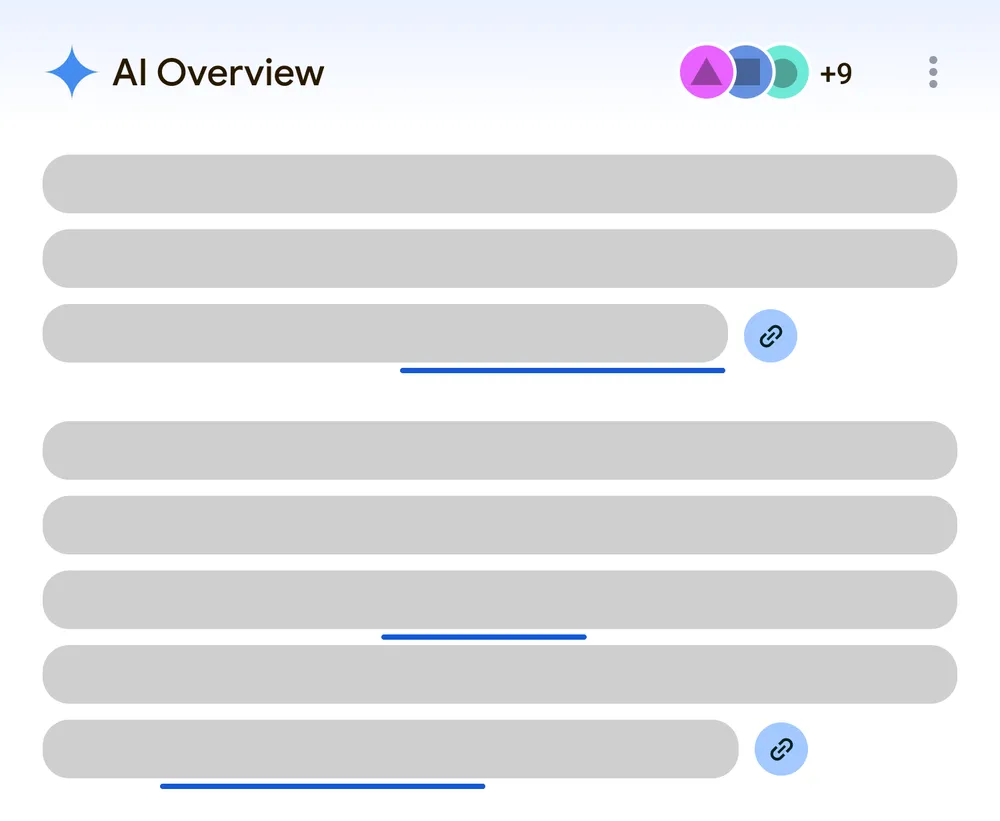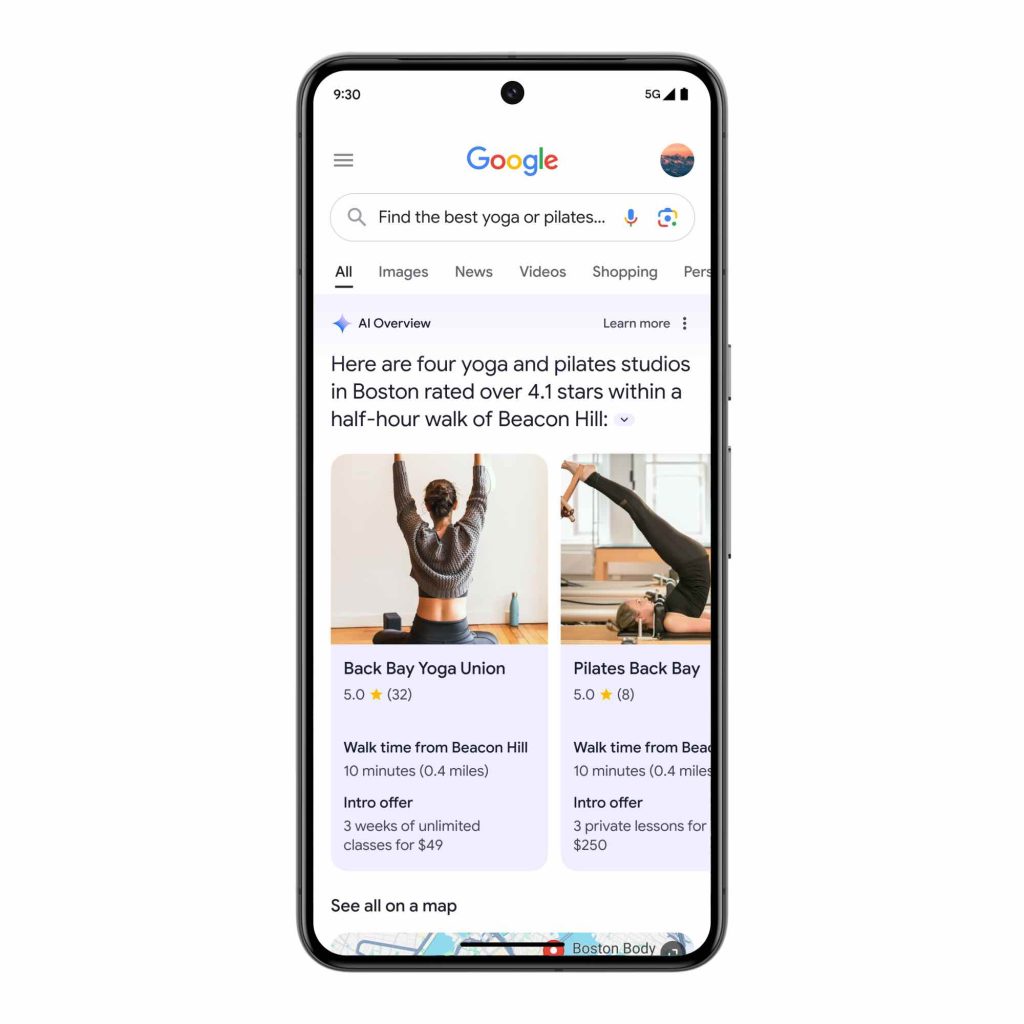Welcome to the first article of this blog! 🙂 I am especially excited, but also respectful, to write this post because, like any relationship that begins, the first impression is important and, obviously, I want us to meet here often. So let’s get to it. I hope you like reading and if you want to give me feedback, I will be happy to read you.
In this first article we are going to talk about AI Overviews, the application of the artificial intelligence to the Google search engine, which has been the evolution of SGE (Search Generative Experience), the first name with which the company baptized this new development in May 2023, but that decided to change in the presentation of Google I/O 2024, a year later, having received comments and some complaints from SEO professionals concerned about the loss of clicks that this new feature of the search engine. (If you like, you can recover the debate about Google I/O and all the news from the presentation we had with Lily Ray, Aleyda Solís and MJ Cachón in the second edition of LaikaParty).
What types of searches does Google AI Overviews answer?
Google’s idea was, and is, to offer broad answers to complex questions faster through its Gemini language model. If until now we could receive a short answer when asking about Messi’s age or the date of the next Spanish elections, the idea is that with AI Overviews we can ask the search engine something like “find the best plans to do this weekend in Barcelona” or “create a 3-day meal plan for a group that is healthy and easy to prepare” and return us a tourist and leisure proposal complete with information updated and a list of recipes and culinary ideas to put into practice in just a few minutes. All this, without leaving Google. And of course, here comes the doubt: Are we going to lose all click potential as AI Overviews is applied to more and more searches? From Google, they wanted to make it clear in advance what their idea was:
“We see that the links included in AI Overviews get more clicks than if the page had appeared as a traditional web listing for that query. As we expand this experience, we’ll continue to focus on sending valuable traffic to publishers and creators. As always, ads will continue to appear in dedicated slots throughout the page, with clear labeling to distinguish between organic and sponsored results.”
Liz Reig, Vice President and Head of Search at Google (May 2024)
The truth is that Google’s business through programmatic advertising with the media still exists, so the technology company is not interested in the publishers lose clicks to your website and, therefore, decrease your page views and advertising impressions. For this reason, editors and content creators are waiting to see how are these citations and links to your websites really going to be produced and, from the media’s SEO teams, we are also monitoring how can this change positioning strategies of the different contents.

Links and citations of sources in AI Overviews. Photo: Google
To pour oil on trouble waters and bring a little peace of mind to the question, some data must be lay on the table. And before AI Overviews, the results with SGE have already gone from representing 65 % to 25 %, according to a research by BrightEdge and published by Search Engine Land and another most recent report carried out by the same company and with data from June 2024, once the deployment of AI Overviews has already begun, showed that only 7 % of queries activated this artificial intelligence in the search engine to create the result. The most significant drop was detected in searches related to education, entertainment and ecommerce products, just after some incorrect answers that generated controversy, such as the recommendation to put glue to your pizza so that the cheese sticks well (Cheese lovers would like such an easy solution, but it doesn’t seem like it’s too “healthy.” If you have suggestions, let Google know.)
Will AI Overviews answer with the latest news and information in real time? Will it be a competitor for publishers?
The rise and interest in the use of artificial intelligence and its impact, as well as its implications for the journalistic sector and the publishing industry, have caused several organizations and companies to begin carrying out studies to monitor the real impact it can have on the business. Just before the activation of AI Overviews the Reuters Institute for the Study of Journalism performed this test with ChatGPT (the OpenAI language model and surely the best known to everyone) and Bard (Google’s, now renamed as Gemini). “When asked to provide the most important news headlines from specific outlets, ChatGPT returned non-news results 52-54 % of the time (almost always in the form of a message like “I’m unable to”). Bard did this 95 % of the time.” As you can see, it seems that the AI still does not understand breaking news.
Even so, more recent verifications suggested that, perhaps, he did understand something. John Shehata, CEO and Founder of NewzDash, explained that they did the experiment with the news of the removal of Kevin McCarthy Ousted as the first president of the United States House of Representatives and AI Overviews already applied it in their response. In that sense, from Google they had stated that “our goal is not to show AI summaries for important news topics, where timeliness and truthfulness are important. For health, we implemented additional activation improvements to improve our quality protections.”

Example of AI Overviews to find the best position to perform yoga or pilates. Photo: Google
But with these results, a more in-depth analysis was needed and NewzDash in collaboration with ZipTie.dev conducted a study with more than 10,000 keywords related to news and trends from ten different thematic categories over nine weeks, which revealed that only 3.9% of current affairs searches triggered AIO (data from June to July 2024). The rest, 96.1 %, did not present any description with artificial intelligence in the search engine and did present the usual search modules. Top Stories, Local News or the standard blue links. (I recommend you read the research and results because I consider that the methodology is especially well planned and applied).
Some implications of AI to consider, according to SEO for News experts
From audience teams in media, the arrival of AI to the search engine is followed closely and with interest, although also with a certain fear, because it may entail a necessary change of direction for the positioning strategy of each publisher. The same factors as always come into play here to know how it can affect large and small publishers and those niche verticals or thematic blogs. Will they be the forgotten ones or the most affected?
What many of us media SEOs surely share is that traffic through the organic channel has been falling more or less continuously for some time now and that the SEO team is no longer a compact team and unrelated to the strategy of the other recruitment channels. Increasingly, the “audience’s team” will be more transversal to be able to draw up an action plan to capitalize on the results and that can increase subscriptions, engagement on social networks, brand growth…
Besides, some SEO experts who work on US news media outlets (the first country to see AI Overviews applied) highlight that if Google does not solve these quality problems in its responses, the users could refer even more to search engines like TikTok or YouTubewhich would cause an impact on traffic, as pointed out Bryan Flaherty,Deputy Director of Audience Strategy at The Washington Post. There are, therefore, those who trust their public and audience, such as Veronica de Souza, Director of Digital News and Audiences in New York Public Radio, who is not in favor of modifying the type of stories they cover due to algorithmic changes because “it would not do our audience any favors”, or Scott Brodbeck, founder and CEO of Local News Now, who believes in value that their product brings to readers,thinking that their audience will go beyond headlines or two lines of text. What everyone expects, therefore, is that the citation of sources and the opportunity to access them with AI Overviews is real and does not harm traffic.
Precisely, and appealing more to the journalistic perspective of this debate, I add one last point with the intention of inviting you all to reflect and that is how the relationship between Google or other companies that are developing language models like ChatGPT or Perplexity and the publishers and content creators should evolve. There are those who have already blocked access to the bots to not let the AI of these companies train with their newspaper library, but there are those who have chosen to close agreements giving them access to their content produced by journalists. What should the journalism industry do? Block or embrace AI? Some models are already offering a program of partners for media… But this topic is enough for another post, so we’ll see you next day.
I hope you found it interesting. If so, I will appreciate it if you share this article with whoever you consider and, if you want, I invite you to write to me for any comments. I will be happy to continue talking about the topic! In the meantime, let’s stop eating pizza and focus on cheese. 😉
